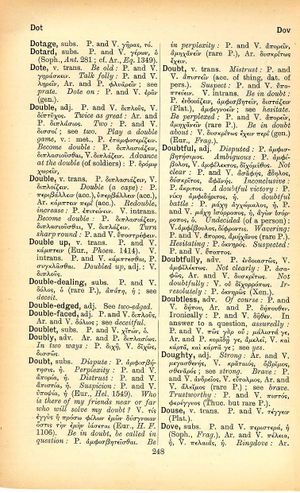doubt: Difference between revisions
τὸ δὲ ποιεῖν ἄνευ νοῦ ἃ δοκεῖ καὶ σὺ ὁμολογεῖς κακὸν εἶναι: ἢ οὔ → but doing what one thinks fit without intelligence is—as you yourself admit, do you not?—an evil
mNo edit summary |
m (Woodhouse1 replacement) |
||
| Line 1: | Line 1: | ||
{{Woodhouse1 | {{Woodhouse1 | ||
|Text=[[File:woodhouse_248.jpg|thumb|link={{filepath:woodhouse_248.jpg}}]] | |Text=[[File:woodhouse_248.jpg|thumb|link={{filepath:woodhouse_248.jpg}}]] | ||
===substantive=== | |||
[[dispute]]: P. [[ἀμφισβήτησις]]. ἡ. | [[dispute]]: [[prose|P.]] [[ἀμφισβήτησις]]. ἡ. | ||
[[perplexily]]: P. and V. [[ἀπορία]], ἡ. | [[perplexily]]: [[prose|P.]] and [[verse|V.]] [[ἀπορία]], ἡ. | ||
[[distrust]]: P. and V. [[ἀπιστία]], ἡ. | [[distrust]]: [[prose|P.]] and [[verse|V.]] [[ἀπιστία]], ἡ. | ||
[[suspicion]]: P. and V. [[ὑποψία]], ἡ (Eur., '' | [[suspicion]]: [[prose|P.]] and [[verse|V.]] [[ὑποψία]], ἡ ([[Euripides|Eur.]], ''[[Helen]]'' 1549). | ||
[[who is there of my friends near]] or [[far who will solve my doubt]]? [[verse|V.]] [[τίς ἐγγὺς ἢ πρόσω φίλων ἐμῶν δύσγνοιαν ὅστις τὴν ἐμὴν ἰάσεται]]; ([[Euripides|Eur.]], ''[[Hercules Furens]]'' 1106). | |||
[[be in doubt]], [[be called in question]]: P. [[ἀμφισβητεῖσθαι]]. | [[be in doubt]], [[be called in question]]: [[prose|P.]] [[ἀμφισβητεῖσθαι]]. | ||
[[be in perplexity]]: P. and V. [[ἀπορεῖν]], [[ἀμηχανεῖν]] (rare P.), Ar. | [[be in perplexity]]: [[prose|P.]] and [[verse|V.]] [[ἀπορεῖν]], [[ἀμηχανεῖν]] (rare [[prose|P.]]), [[Aristophanes|Ar.]] [[δυσκρίτως ἔχειν]]. | ||
===verb transitive=== | |||
[[mistrust]]: P. and V. [[ἀπιστεῖν]] (acc. of [[thing]]. dat. of pers.). | [[mistrust]]: [[prose|P.]] and [[verse|V.]] [[ἀπιστεῖν]] (acc. of [[thing]]. dat. of pers.). | ||
[[suspect]]: P. and V. [[ὑποπτεύειν]]. | [[suspect]]: [[prose|P.]] and [[verse|V.]] [[ὑποπτεύειν]]. | ||
===verb intransitive=== | |||
[[be | [[be in doubt]]: [[prose|P.]] [[ἐνδοιάζειν]], [[ἀμφισβητεῖν]], [[διστάζειν]] ([[Plato]]), [[ἀμφιγνοεῖν]]; see [[hesitate]]. | ||
[[be in doubt about]]: V. [[δυσκρίτως ἔχειν περί]] (gen.) (Eur., '' | [[be perplexed]]: [[prose|P.]] and [[verse|V.]] [[ἀπορεῖν]], [[ἀμηχανεῖν]] (rare [[prose|P.]]). | ||
[[be in doubt about]]: [[verse|V.]] [[δυσκρίτως ἔχειν περί]] (gen.) ([[Euripides|Eur.]], ''Fragment''). | |||
}} | }} | ||
Revision as of 08:50, 20 May 2020
English > Greek (Woodhouse)
substantive
dispute: P. ἀμφισβήτησις. ἡ.
perplexily: P. and V. ἀπορία, ἡ.
distrust: P. and V. ἀπιστία, ἡ.
suspicion: P. and V. ὑποψία, ἡ (Eur., Helen 1549).
who is there of my friends near or far who will solve my doubt? V. τίς ἐγγὺς ἢ πρόσω φίλων ἐμῶν δύσγνοιαν ὅστις τὴν ἐμὴν ἰάσεται; (Eur., Hercules Furens 1106).
be in doubt, be called in question: P. ἀμφισβητεῖσθαι.
be in perplexity: P. and V. ἀπορεῖν, ἀμηχανεῖν (rare P.), Ar. δυσκρίτως ἔχειν.
verb transitive
mistrust: P. and V. ἀπιστεῖν (acc. of thing. dat. of pers.).
suspect: P. and V. ὑποπτεύειν.
verb intransitive
be in doubt: P. ἐνδοιάζειν, ἀμφισβητεῖν, διστάζειν (Plato), ἀμφιγνοεῖν; see hesitate.
be perplexed: P. and V. ἀπορεῖν, ἀμηχανεῖν (rare P.).
be in doubt about: V. δυσκρίτως ἔχειν περί (gen.) (Eur., Fragment).

